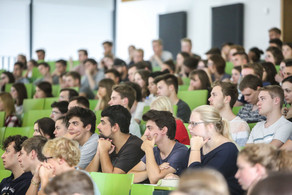Prof. Dr. Norbert Zmyj
Arbeitsschwerpunkte
- Einfluss von Stress auf Handlungswahrnehmung
- Entwicklung von Ich-Bewusstsein, Imitation und Theory of Mind
- Entwicklung von Einstellungen zu Gruppen
- Einflussfaktoren auf die Entstehung falscher Erinnerungen bei Kindern
Sprechzeiten
Nach Bedarf und vorheriger eMail-Vereinbarung
- per ZOOM oder
- in E-F-50, Raum 2.236
Weitere Informationen
seit 2015
Professor (W3) für Entwicklungspsychologie
TU Dortmund
2013
Positive Evaluation der Juniorprofessur
2010 - 2015
Juniorprofessor (W1) für Angewandte Sozial- und Entwicklungspsychologie
Ruhr-Universität Bochum
2009 - 2010
Post-doc
Max-Planck-Institut für Kognitions- und Neurowissenschaften, Leipzig
2009
Promotion zum Dr. rer. nat.
Thema der Dissertationsschrift: „Selective imitation in one-year-olds: How a model’s characteristics influence imitation“
2005 - 2008
Doktorand
Max-Planck-Institut für Kognitions- und Neurowissenschaften, Leipzig
(Stipendiat im DFG- Graduiertenkolleg „Funktion von Aufmerksamkeit bei kognitiven Prozessen“, DFG 1182)
2005
Diplom in Psychologie
Thema der Diplomarbeit: „Geschlechtsidentität, Zeitverständnis und Theory of Mind. Kognitiver Strukturwandel zwischen dem vierten und sechsten Lebensjahr“
2002 - 2005
Studentische Hilfskraft
Max-Planck-Institut für Psychologie, München
Nachwuchsgruppe „Entwicklung von Kognition und Handlung“ (Leitung: Gisa Aschersleben)
2000 - 2005
Psychologiestudium
Ludwig-Maximilians Universität, München
Artikel in Zeitschriften mit Gutachtersystem
Im Druck
- Zmyj, N. & Klein-Radukic, S. (im Druck). Infants’ sense of self revisited – Mixed evidence from two studies on 6-month-olds’ preference for delayed visual feedback. International Journal of Behavioral Development.
2025
- Sieber, F., Czarnomski, J., Daum, M. M., & Zmyj, N. (2025). The relation between goal-predictive gaze behavior and imitation – A live eye-tracking study in 12-month-olds. Infancy, 30(6), e70050. https://doi.org/10.1111/infa.70050
- Sieber, F., Czarnomski, J., Schölmerich, A., Daum, M. M., & Zmyj, N. (2025). The two functions of imitation in the second year of life – a longitudinal study. Developmental Psychology, 61(9), 1653–1668. https://doi.org/10.1037/dev0001856
- Zmyj, N., Goll, T., & Zaborski, J. (2025). The development of preschool children’s use of the majority rule. Social Development, 34(4), e70027. https://doi.org/10.1111/sode.70027
- Seehagen, S. Bartnik, C., Kärtner, J., Krasko, J., Luhmann, M., Schaal, N., Schneider, S., Witt, S., & Zmyj, N. (2025). Belong, broaden, and build: The role of positive emotions for early human development. Child Development Perspectives, 19(4), 237-243. https://doi.org/10.1111/cdep.70002
- Adam, M., Elsner, B., & Zmyj, N. (2025). Perspective matters in goal-predictive gaze shifts during action observation: Results from 6-, 9-, and 12-month-olds and adults. Journal of Experimental Child Psychology, 249, 106075. doi: org/10.1016/j.jecp.2024.106075
2023
- Margoni, F., Block, K., Hamlin, K., Zmyj, N., & Schmader, T. (2023). Meta-analytic evidence against sex differences in infants’ and toddlers’ preference for prosocial agents. Developmental Psychology, 59(2), 229–235. doi: 10.1037/dev0001421
- Vaporova, E. & Zmyj, N. (2023). Children’s suggestibility for neutral arbitrary actions in the context of norm violations. PLOS ONE, 18, e0286241. doi: 10.1371/journal.pone.0286241
- Witt, S., Seehagen, S., & Zmyj, N. (2023). Stress affects the prediction of others’ behavior. PLOS ONE, 18, e0283782. doi: 10.1371/journal.pone.0283782
- Tisborn, K., Kumsta, R., Zmyj, N. & Seehagen, S. (2023). A matter of habit? Stressful life events and cognitive flexibility in 15-month-old infants. Infant Behavior and Development, 71, 101810.
doi: 10.1016/j.infbeh.2023.101810 - Klein-Radukic, S. & Zmyj, N. (2023). The predictive value of the cognitive scale of the Bayley Scales of Infant and Toddler Development-III. Cognitive Development, 65, 101291.
doi: 10.1016/j.cogdev.2022.101291
2022
- Witt, S., Seehagen, S. & Zmyj, N. (2022). The influence of group membership on false-belief attribution in preschool children. Journal of Experimental Child Psychology, 222, No. 105467.
doi: 10.1016/j.jecp.2022.105467 - Zmyj, N., Rausch, A., Schröder, L. & Seehagen, S. (2022). The development of children’s egalitarianism in the context of group membership and resource valence. Zeitschrift für Entwicklungspsychologie und Pädagogische Psychologie, 54, 93-104. doi: 10.1026/0049-8637/a000255
- Sieber, F. & Zmyj, N. (2022). Stability and structure of infant and toddler temperament in two longitudinal studies in Germany. Infant Behavior and Development, 67, No. 101714.
doi: 10.1016/j.infbeh.2022.101714 - Buttelmann, D., Kühn, K. & Zmyj, N. (2022). The relations among Theory of Mind, inhibitory control, and aggressive behavior in 4-year-old children – A multi-measure multi-informant approach. Journal of Cognition and Development, 23, 111-134. doi: 10.1080/15248372.2021.1987240
2021
- Seehagen, S., Herbert, J. & Zmyj, N. (2021). Prior sleep timing and visual recognition of emotional faces in 6-month-old infants. Infant Behavior and Development, 65, No. 101655.
doi: 10.1016/j.infbeh.2021.101655
2020
- Buttelmann, D. & Zmyj, N. (2020). Fourteen-month-olds’ imitation is influenced more strongly by a model’s competence than by a model’s certainty. Infant Behavior and Development, 60, No. 101458. doi: 10.1016/j.infbeh.2020.101458
- Klein-Radukic, S. & Zmyj, N. (2020). No evidence for infants' contingency detection as a precursor of toddlers' self-recognition. Infant Behavior and Development, 60, No. 101459.
doi: 10.1016/j.infbeh.2020.101459 - Vaporova, E. & Zmyj, N. (2020). Social evaluation and imitation of prosocial and antisocial agents in infants, children, and adults. PLoS one, 15 (9), No. e0235595. doi: 10.1371/journal.pone.0235595
- Zmyj, N. & Seehagen, S. (2020). A model’s competence influences false-belief attribution in preschoolers. European Journal of Developmental Psychology, 17, 123-137. doi: 10.1080/17405629.2018.1545641
- Zmyj, N. & Huber-Bach, L. (2020). German adolescents’ homonegativity and the relationship to their religious denomination and gender role orientation. Journal of LGBT Youth, 17, 241-259. doi: 10.1080/19361653.2019.1641174
2019
- Müller, D., Teismann, T., Hirschfeld, G., Zmyj, N., Fuths, S., Vocks, S., Schneider, S., & Seehagen, S. (2019). The course of maternal repetitive negative thinking at the transition to motherhood and early mother-infant interaction: Is there a link? Development and Psychopathology, 31, 1411-1421. doi: 10.1017/S0954579418000883
- Zmyj, N. & Wehlig, R. (2019). Reducing homonegativity among German adolescents: Results of a six-week follow-up study. Journal of LGBT Youth, 16, 435-450. doi: 10.1080/19361653.2019.1590286
- Seehagen, S., Zmyj, N., & Herbert, J. (2019). Remembering in the context of internal states: The role of sleep for infant memory. Child Development Perspectives, 13, 110-115. doi: 10.1111/cdep.12321
2018
- Seehagen, S., Dreier, L., & Zmyj, N. (2018). Overrated adults: 4-year-olds’ false belief understanding is influenced by the believer’s age. Journal of Experimental Child Psychology, 167, 328-335. doi:10.1016/j.jecp.2017.11.007
- Witt, S., Lücke, T., Neumann, N., Weitkämper, A., & Zmyj, N. (2018). Delayed Theory of Mind development in children born preterm: A longitudinal study. Early Human Development, 127, 85-89. doi: 10.1016/j.earlhumdev.2018.10.005
- Zmyj, N. (2018). The relationship of delay of gratification and time comprehension in 4-year-old children. International Journal of Behavioral Development, 42, 434–438. doi: 10.1177/0165025417727870
2017
- Beisert, M., Zmyj, N., & Daum, M. M. (2017). Turning the tide: A plea for cognitively lean interpretations of infant behaviour (Comment on Keven and Akins). Behavioral and Brain Sciences, 40, e381. doi:10.1017/S0140525X16001849
- Hüning, B. M., Assing, B., Weishaupt, E., Dransfeld, F., Felderhoff-Müser, U., & Zmyj, N. (2017). Delay of gratification and time comprehension is impaired in very preterm children at the age of 4 years. Early Human Development, 115, 77-81. doi:10.1016/j.earlhumdev.2017.09.018
- Seehagen, S., Schneider, S., Miebach, K., Frigge, K. & Zmyj, N. (2017). Should I or shouldn’t I?" Imitation of undesired versus allowed actions from peer and adult models by 18- and 24-month-old toddlers. Infant Behavior and Development, 49, 1-18. doi:10.1016/j.infbeh.2017.06.001
- Knoll-Pientka, N., Schröder, L., Zmyj, N. & Hebebrand, J. (2017). Genetischer Einfluss auf die Varianz im prosozialen Verhalten. Kindheit und Entwicklung, 26, 184-195. doi:10.1026/0942-5403/a000230
- Zmyj, N., Schölmerich, A., & Daum, M. M. (2017). The relationship between attention and deferred imitation in 12-month-old infants. Infant Behavior and Development, 48, 175-183. doi:10.1016/j.infbeh.2017.02.001
- Zmyj, N.*, Witt, S.*, Weitkämper, A., Neumann, H., & Lücke, T. (2017). Social cognition in children born preterm: A perspective on future research directions. Frontiers in Psychology, 8, 455. doi:10.3389/fpsyg.2017.00455
*geteilte Erstautorenschaft - Zmyj, N. & Marcinkowski, N. (2017). The relationship between infants' interest in feedback of self-performed actions with different latency and their parents' temporally contingent behavior. Cognitive Development, 41, 85-93. doi:10.1016/j.cogdev.2017.01.002
- Zmyj, N., Schneider, S. & Seehagen, S. (2017). 15-month-old infants' cortisol levels decrease after a 30-min-warm-up procedure. Psychoneuroendocrinology, 76, 11-13. doi:10.1016/j.psyneuen.2016.11.010.
2016
- Krieger, A.A.R., Möller, C., Zmyj, N., & Aschersleben, G. (2016). Tom is not more likely to imitate Lisa than Ying. The influence of a model’s race indicated by physical appearance on children’s imitation. Frontiers in Psychology, 7, 972. doi:10.3389/fpsyg.2016.00972.
- Henning, A. & Zmyj, N. (2016). Infant do, infant see: The role of feedback to infant behavior for the understanding of self and others. Infant and Child Development, 25, 233-239. doi:10.1002/icd.1987
- Schröder, L., Seehagen, S., Zmyj, N. & Hebebrand, J. (2016). Wie Du mir, so ich Dir? Die Entwicklung von prosozialem Verhalten und der Zusammenhang mit externalisierenden und internalisierenden Auffälligkeiten. Zeitschrift für Kinder- und Jugendpsychiatrie und Psychotherapie, 44, 31-38. doi:10.1024/1422-4917/a000396
- Klein-Radukic, S. & Zmyj, N. (2016). The relation between contingency preference and imitation in 6–8-month-old infants. International Journal of Behavioral Development, 40, 173-180. doi:10.1177/0165025415575624
2015
- Seehagen, S., Schneider, S., Rudolph, J., Ernst, S., & Zmyj, N. (2015). Stress impairs cognitive flexibility in infants. PNAS, 112, 12882–12886. doi:10.1073/pnas.1508345112
- Klein-Radukic, S. & Zmyj, N. (2015). Dropout in looking time studies: The role of infants’ temperament and cognitive developmental status. Infant Behavior and Development, 41, 142-153. doi:10.1016/j.infbeh.2015.10.001
- Zmyj, N. & Bischof-Köhler, D. (2015). The development of gender constancy in early childhood and its relation to time comprehension and false-belief understanding. Journal of Cognition and Development, 16, 455-470. doi:10.1080/15248372.2013.824881
- Zmyj, N., Prinz, W. & Daum, M. M. (2015). Eighteen-month-olds’ memory interference and distraction in a modified A-not-B task is not associated with their anticipatory looking in a false-belief task. Frontiers in Psychology, 6, 857. doi:10.3389/fpsyg.2015.00857
- Zmyj, N. & Klein-Radukic, S. (2015). Six-month-old infants’ interaction difficulties are mirrored in their preference for perfect contingencies. Infant Mental Health Journal, 36, 193-199. doi:10.1002/imhj.21503
2014
- Zmyj, N. & Buttelmann, D. (2014). An integrative model of rational imitation in infancy. Infant Behavior and Development, 37, 21-28. doi:10.1016/j.infbeh.2013.10.001
2013
- Zmyj, N. & Seehagen, S. (2013). The role of a model’s age for young children’s imitation: A research review. Infant and Child Development, 22, 622-641. doi:10.1002/icd.1811
- Zmyj, N., Prinz, W. & Daum, M. M. (2013). The relation between mirror self-image reactions and imitation in 14- and 18-month-old infants. Infant Behavior and Development, 36, 809-816. doi:10.1016/j.infbeh.2013.09.002
- Buttelmann, D., Zmyj, N., Daum, M. M. & Carpenter, M. (2013). Selective imitation of in-group over out-group members in 14-month-old infants. Child Development, 84, 422-428. doi:10.1111/j.1467-8624.2012.01860.x
2012
- Buttelmann, D. & Zmyj, N. (2012). Evaluating the empirical evidence for the motor resonance account. A commentary on Paulus, Hunnius, Vissers & Bekkering (2011). Frontiers in Psychology. 3, 512. doi:10.3389/fpsyg.2012.00512
- Zmyj, N., Aschersleben, G., Prinz, W. & Daum, M. M. (2012). The peer model advantage in infants’ imitation of familiar gestures performed by differently aged models. Frontiers in Psychology, 3, 252. doi:10.3389/fpsyg.2012.00252
- Beisert, M., Zmyj, N., Liepelt, R., Jung, F., Prinz, W. & Daum, M. M. (2012). Rethinking ‘Rational Imitation’ in 14-month-old infants: A perceptual distraction approach. PLOS ONE, 7, e32563. doi:10.1371/journal.pone.0032563
- Zmyj, N., Daum, M. M., Prinz, W. & Aschersleben, G. (2012). Infants' attentional preference for object-related actions of older children compared to object-related actions of peers and adults. Infant Behavior and Development, 35, 533-542. doi:10.1016/j.infbeh.2012.03.003
- Zmyj, N., Daum, M. M., Prinz, W., Nielsen, M. & Aschersleben, G. (2012). Fourteen-month-olds’ imitation of differently aged models. Infant and Child Development, 21, 250-266. doi:10.1002/icd.750
2011
- Zmyj, N., Jank, J., Schütz-Bosbach, S. & Daum, M. M. (2011). Detection of visual-tactile contingency in the first year after birth. Cognition, 120, 82-89. doi:10.1016/j.cognition.2011.03.001
2010
- Zmyj, N., Buttelmann, D., Carpenter, M. & Daum, M. M. (2010). The reliability of a model influences 14-month-olds' imitation. Journal of Experimental Child Psychology, 106, 208-220. doi:10.1016/j.jecp.2010.03.002
2009
- Zmyj, N., Hauf, P. & Striano, T. (2009). Discrimination between real-time and delayed visual feedback of self-performed leg movements in the first year of life. Cognition, Brain, Behavior, 13(4), 479-489.
- Zmyj, N., Daum, M. M. & Aschersleben, G. (2009). The development of rational imitation in 9- and 12-month-old infants. Infancy, 14, 131-141. doi:10.1080/15250000802569884
Bücher und Buchkapitel
2025
- Bischof-Köhler, D. & Zmyj, N. (2025). Soziale Entwicklung in Kindheit und Jugend. Empathie, Theory of Mind und Bindung (2. Auflage). Kohlhammer.
2021
- Zmyj, N. (2021). Demokratiepädagogik in der Kindertagesstätte – eminenz- oder evidenzbasiert? In: In T. Goll & I. Schmidt (Hrsg.), Politische Bildung von Anfang an? (S. 87-107). Bad Heilbrunn: Verlag Julius Klinkhardt.
2018
- Zmyj, N. & Leyendecker, B. (2018). Förderung von Kleinkindern in der Tagesbetreuung. In W. Schneider & U. Lindenberger (Hrsg.), Entwicklungspsychologie (8. Aufl., S. 587-610). Weinheim: Beltz.
2016
- Zmyj, N. (2016). Über die Notwendigkeit einer evidenzbasierten Antidiskriminierungsarbeit mit Jugendlichen. In Rosa Strippe e.V. (Hrsg.), Ausgrenzung - Verfolgung - Akzeptanz (S. 111-125). Hamburg: Marta Press.
2012
- Zmyj, N. & Schölmerich, A. (2012). Förderung von Kleinkindern in der Tagesbetreuung. In W. Schneider & U. Lindenberger (Hrsg.), Entwicklungspsychologie (S. 581-592). Weinheim: Beltz.
2008
- Daum, M. M., Zmyj, N. & Aschersleben, G. (2008). Early ontogeny of action perception and production. In F. Morganti, A. Carassa, & G. Riva (Hrsg.), Enacting intersubjectivity: A cognitive and social perspective to the study of interactions (S. 175-186). Amsterdam: IOS Press.
seit 2017
Zeitschrift für Entwicklungspsychologie und Pädagogische Psychologie
Mitherausgeber
2015-2019
Frontiers in Developmental Psychology
Associate Editor
2017 - 2020
Deutsche Forschungsgemeinschaft:
"Der Zusammenhang zwischen Temperament und Imitation im zweiten Lebensjahr"
(ZM 54/6-1)
2013 - 2014
Mercator Research Center Ruhr:
„Wie teilen Kinder mit Gleichaltrigen? Die Entwicklung von Fairness bei 6- bis 12- jährigen Kindern mit und ohne klinische Störungen“
(An-2013-0031)
2012 - 2013
Mercator Research Center Ruhr:
„Der Zusammenhang zwischen Zeitverständnis und Bedürfnisaufschub im Vorschulalter“
(An-2012-0041)
2012 - 2015
Deutsche Forschungsgemeinschaft:
„Der Zusammenhang zwischen Kontingenzwahrnehmung und Selbstobjektivierung in der frühen Kindheit“
(ZM 54/2-1)





